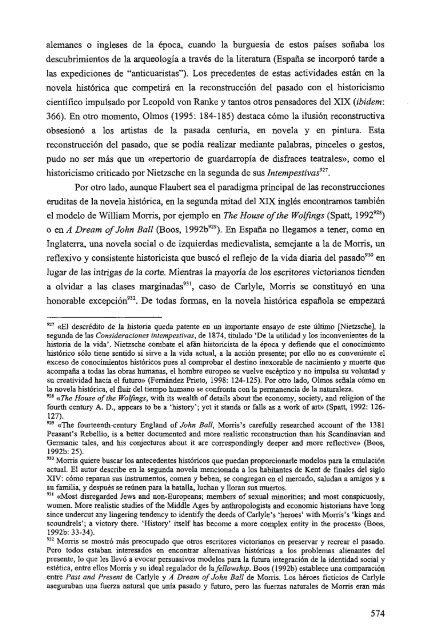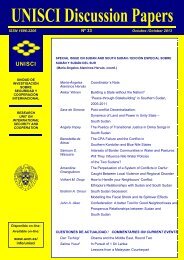la poesía - Universidad Complutense de Madrid
la poesía - Universidad Complutense de Madrid
la poesía - Universidad Complutense de Madrid
You also want an ePaper? Increase the reach of your titles
YUMPU automatically turns print PDFs into web optimized ePapers that Google loves.
alemanes o ingleses <strong>de</strong> <strong>la</strong> época, cuando <strong>la</strong> burguesía <strong>de</strong> estos países soñaba los<br />
<strong>de</strong>scubrimientos <strong>de</strong> <strong>la</strong> arqueología a través <strong>de</strong> <strong>la</strong> literatura (España se incorporó tar<strong>de</strong> a<br />
<strong>la</strong>s expediciones <strong>de</strong> “anticuaristas”). Los prece<strong>de</strong>ntes <strong>de</strong> estas activida<strong>de</strong>s están en <strong>la</strong><br />
nove<strong>la</strong> histórica que competirá en <strong>la</strong> reconstrucción <strong>de</strong>l pasado con el historicismo<br />
científico impulsado por Leopold von Ranke y tantos otros pensadores <strong>de</strong>l XIX (ibí<strong>de</strong>m:<br />
366). En otro momento, Olmos (1995: 184-185) <strong>de</strong>staca cómo <strong>la</strong> ilusión reconstructiva<br />
obsesionó a los artistas <strong>de</strong> <strong>la</strong> pasada centuria, en nove<strong>la</strong> y en pintura. Esta<br />
reconstrucción <strong>de</strong>l pasado, que se podía realizar mediante pa<strong>la</strong>bras, pinceles o gestos,<br />
pudo no ser más que un «repertorio <strong>de</strong> guardarropía <strong>de</strong> disfraces teatrales», como el<br />
historicismo criticado por Nietzsche en <strong>la</strong> segunda <strong>de</strong> sus Intempestivas 927.<br />
Por otro <strong>la</strong>do, aunque F<strong>la</strong>ubert sea el paradigma principal <strong>de</strong> <strong>la</strong>s reconstrucciones<br />
eruditas <strong>de</strong> <strong>la</strong> nove<strong>la</strong> histórica, en <strong>la</strong> segunda mitad <strong>de</strong>l XIX inglés encontramos también<br />
el mo<strong>de</strong>lo <strong>de</strong> William Monis, por ejemplo en Tite House oftite Wolfings (Spatt, 1992928)<br />
o en A Dream of John Balí (Boos, 1992b929). En España no llegamos a tener, como en<br />
Ing<strong>la</strong>terra, una nove<strong>la</strong> social o <strong>de</strong> izquierdas medievalista, semejante a <strong>la</strong> <strong>de</strong> Monis, un<br />
reflexivo y consistente historicista que buscó el reflejo <strong>de</strong> <strong>la</strong> vida diaria <strong>de</strong>l pasado930 en<br />
lugar<strong>de</strong> <strong>la</strong>s intrigas <strong>de</strong> <strong>la</strong> corte. Mientras <strong>la</strong> mayoría <strong>de</strong> los escritores victorianos tien<strong>de</strong>n<br />
a olvidar a <strong>la</strong>s c<strong>la</strong>ses marginadas931, caso <strong>de</strong> Carlyle, Monis se constituyó en una<br />
honorable excepción932. De todas formas, en <strong>la</strong> nove<strong>la</strong> histórica españo<strong>la</strong> se empezará<br />
927 «El <strong>de</strong>scrédito <strong>de</strong> <strong>la</strong> historia queda patente en un importante ensayo <strong>de</strong> este último [Nietzsche],<strong>la</strong><br />
segunda<strong>de</strong> <strong>la</strong>s Consi<strong>de</strong>raciones intempestivas, <strong>de</strong> 1874, titu<strong>la</strong>do ‘De <strong>la</strong>utilidad y los inconvenientes <strong>de</strong> <strong>la</strong><br />
historia <strong>de</strong> <strong>la</strong> vida’. Nietzsche combate el afán historicista <strong>de</strong> <strong>la</strong> época y <strong>de</strong>fien<strong>de</strong> que el conocimiento<br />
histórico sólo tiene sentido si sirve a <strong>la</strong> vida actual, a <strong>la</strong> acción presente; por ello no es conveniente el<br />
exceso <strong>de</strong> conocimientos históricos pues al comprobar el <strong>de</strong>stino inexorable <strong>de</strong> nacimiento y muerte que<br />
acompaña a todas <strong>la</strong>s obras humanas, el hombre europeo se vuelve escéptico y no impulsa su voluntad y<br />
su creatividad hacia el futuro» (Fernán<strong>de</strong>z Prieto, 1998: 124-125). Por otro <strong>la</strong>do, Olmos seña<strong>la</strong> cómo en<br />
<strong>la</strong>nove<strong>la</strong> histórica, el fluir <strong>de</strong>l tiempo humano se confronta con <strong>la</strong> permanencia <strong>de</strong> <strong>la</strong> naturaleza.<br />
928 «The House ofthe Wolfings, with its wealth of <strong>de</strong>tails about the economy, society, and religion of te<br />
fourth century A. D., appears to be a ‘bistory’; yet it stands or falis as a worlc of art» (Spatt, 1992: 126-<br />
127).<br />
929 «Ihe fourteenth-century Eng<strong>la</strong>nd of John Salí, Morris’s carefully researched account of te 1381<br />
Peasant’s Rebellio, is a better documented and more realistic reconstruction tan his Scandinavian and<br />
Germanic tales, and his conjectures about it are correspondingly <strong>de</strong>eper and more reflective» (Baos,<br />
1992b: 25).<br />
930 Morris quiere buscar los antece<strong>de</strong>ntes históricos que puedan proporcionarle mo<strong>de</strong>los para <strong>la</strong> emu<strong>la</strong>ción<br />
actual. El autor <strong>de</strong>scribe en <strong>la</strong> segunda nove<strong>la</strong> mencionada a los habitantes <strong>de</strong> Kent <strong>de</strong> fmales <strong>de</strong>l siglo<br />
XIV: cómo reparan sus instrumentos, comen y beben, se congregan en el mercado, saludan a amigos y a<br />
su familia, y <strong>de</strong>spués se reúnen para <strong>la</strong> batal<strong>la</strong>, luchan y lloran sus muertos.<br />
93’ «Most disregar<strong>de</strong>d Jews and non-Europeans; members of sexual minorities; and most conspicuosly,<br />
women. More realistic studies ofte Middle Ages by anthropólogist.s and economic historians have long<br />
since un<strong>de</strong>rcut any lingering ten<strong>de</strong>ncy to i<strong>de</strong>ntify te <strong>de</strong>eds of Carlyle’s ‘heroes’ wit Morris’s ‘kings and<br />
scoundrels’; a victory tere. ‘History’ itself has become a more complex entity in te process» (Boas,<br />
1992b: 33-34).<br />
932 Morris se mostró más preocupado que otros escritores victorianos en preservar y recrear el pasado.<br />
Pero todos estaban interesados en encontrar alternativas históricas a los problemas alienantes <strong>de</strong>l<br />
presente, lo que les llevó a evocar persuasivos mo<strong>de</strong>los para <strong>la</strong> futura integración <strong>de</strong> <strong>la</strong> i<strong>de</strong>ntidad social y<br />
estética, entre ellos Monis y su i<strong>de</strong>al regu<strong>la</strong>dor <strong>de</strong> <strong>la</strong>fellowshzp. Boas (1992b) establece una comparación<br />
entre Pan and Present <strong>de</strong> Carlyle y A Dream of John Raíl <strong>de</strong> Monis. Los héroes ficticios <strong>de</strong> Carlyle<br />
aseguraban una fuerza natural que unía pasado y futuro, pero <strong>la</strong>s fuerzas naturales <strong>de</strong> Monis eran más<br />
574

















